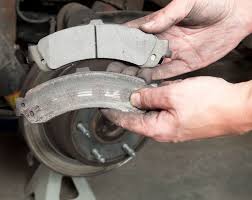When it comes to your car, nothing is more important than safety. One of the key players in keeping you safe on the road is your brake pads. But how do you know when it’s time to replace them? Ignoring worn-out brake pads isn’t just bad for your car; it’s dangerous. In this article, we’ll break down everything you need to know about spotting the signs of wear, understanding why it happens, and choosing the right replacements.

Understanding Brake Pads
Brake pads are small but mighty components in your car’s braking system. They work by creating friction against the brake rotor (the shiny disc you see behind your wheel rims). This friction slows down your vehicle, helping you stop safely. Without functional brake pads, stopping your car would be, well, nearly impossible.
Types of Brake
Pads
Not all brake pads are created equal. They come in a few varieties, each with its pros and cons:
– Ceramic Brake Pads: These are long-lasting and quiet but tend to be more expensive.
– Metallic Brake Pads: Made from metal blends, these are durable and affordable but can be noisy.
– Organic Brake Pads: The budget-friendly option, but they wear out faster and may not perform as well under high heat.
Why Brake Pads Wear Out
Over time, brake pads naturally wear down due to friction. But some factors speed up this process. Let’s dive into a few:
- Driving Habits: Are you a “brake at the last second” kind of driver? Aggressive braking habits can wear down pads faster than a careful, smooth approach. Learn to anticipate stops to save both your pads and your nerves.
- Road Conditions: Driving on steep hills or in stop-and-go traffic? These conditions put extra stress on your brake pads, wearing them out sooner. City drivers, this one’s for you.

Signs That It’s Time to Replace Brake Pads
Your car often tells you when something’s wrong—if you know how to listen. Here are the top signs it’s time to swap out your brake pads:
- Squeaking or Squealing Noises: That high-pitched noise isn’t just annoying; it’s a built-in feature of many brake pads. It’s a warning sound designed to alert you that the pads are nearing the end of their life.
- Reduced Braking Efficiency: Does it feel like you need more distance to come to a full stop? Worn brake pads can make braking less effective, increasing your risk of an accident.
- Brake Pedal Vibrations: If pressing the brake feels like a dance party underfoot, it’s a sign that your pads or rotors are uneven and need attention.
- Dashboard Warning Light: Many modern cars have a dashboard light specifically for brakes. If it’s lit, don’t ignore it. It’s often linked to worn pads or low brake fluid.
Checking Your Brake Pads
Regular inspections can save you from expensive repairs later. Here’s how to check your brake pads:
- Measuring Brake Pad Thickness: Use a caliper or ruler to measure the pad thickness through your wheel spokes. Anything less than 3mm means it’s time for a replacement.
- Visual Cues to Look For: Peek through the gaps in your wheel rims. Worn pads may appear thin or uneven compared to new ones.
How Often Should You Replace Brake Pads?
Brake pads don’t last forever, but how often should you replace them? The answer depends on a mix of factors.
- Manufacturer Recommendations: Always check your car’s manual. Manufacturers often include guidelines for when to replace brake pads based on your vehicle model.
- Mileage Guidelines: On average, brake pads last anywhere from 20,000 to 70,000 miles. Frequent drivers, especially in cities, may need replacements sooner.
Choosing the Right Brake Pads
- Matching Pads to Your Vehicle: Not all pads fit all cars. Make sure the ones you choose are compatible with your vehicle’s make and model.
- Cost vs. Quality: Don’t skimp on brake pads. While cheaper options might save you money upfront, they could cost you more in the long run due to frequent replacements or reduced safety.
Conclusion
Your brake pads are a small investment in your safety and peace of mind. Ignoring the signs of wear can lead to expensive repairs—or worse, accidents. Regularly checking and replacing your brake pads ensures your car performs at its best. So, the next time you hear that squeak or feel a vibration, don’t wait. Take action. You can also reach out to our mobile mechanic to help check out your brake pad and get affordable mobile mechanics at your doorstep



